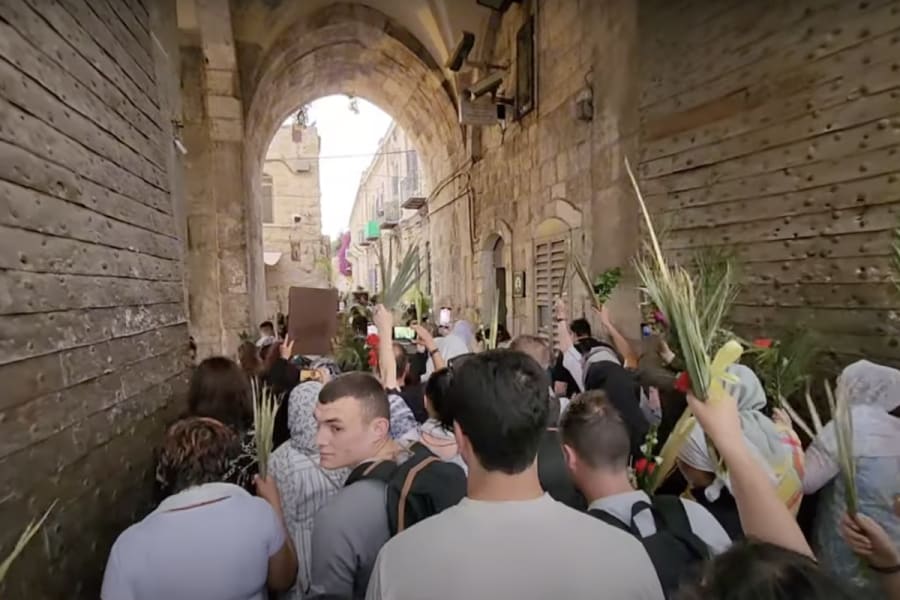Orthodox Christians celebrate Palm Sunday in Jerusalem

For Orthodox Christians throughout the world, Holy Week has begun.
On Saturday evening, Orthodox Christians from Israel and around the world celebrated the beginning of Palm Sunday, the day when Christ, in fulfillment of the Hebrew Scriptures, entered Jerusalem on a donkey.
As in Judaism, the Orthodox Church counts the evening as the beginning of the day.
Large crowds of Orthodox Christians gathered at the Orthodox monastery in Bethphage, built on the site where, according to Orthodox tradition, the donkey and colt that Christ rode into Jerusalem were tethered.
As written in the Book of Matthew: “Now when they drew near to Jerusalem and came to Bethphage, to the Mount of Olives, then Jesus sent two disciples, saying to them, ‘Go into the village in front of you, and immediately you will find a donkey tied, and a colt with her. Untie them and bring them to me.’”(Matthew 21:1-2 ESV).
Matthew writes that this was to fulfill a messianic prophecy from the Hebrew prophet Zechariah:
“Rejoice greatly, O daughter of Zion!
Shout aloud, O daughter of Jerusalem!
Behold, your king is coming to you;
righteous and having salvation is he,
humble and mounted on a donkey,
on a colt, the foal of a donkey.”
(Zechariah 9:9 ESV)
From the monastery in Bethphage, Greek Orthodox Patriarch of Jerusalem Theophilos III, along with other Orthodox leaders, led the many Christians who had gathered to the Mount of Olives, past the Garden of Gethsemane, past the traditional tomb of Mary, and into the Old City of Jerusalem through the Lion’s Gate.
The Israeli government provided security for Saturday’s procession, which took place without any reported disturbances.
During the procession, Orthodox Christians sang hymns in multiple languages and carried palm branches, some of which were fashioned in the shape of the cross. Palm branches are traditionally carried in memory of the people of Jerusalem’s initial response to Christ’s triumphal entrance into Jerusalem, as recorded in the Gospels.
“So they took branches of palm trees and went out to meet him, crying out, ‘Hosanna! Blessed is he who comes in the name of the Lord, even the King of Israel!’” (John 12:13).
Because the vast majority of Orthodox Christians calculate the date of Easter following the Old Calendar (the Julian Calendar), Orthodox Christians usually celebrate Holy Week at a different time than Roman Catholics and Protestants.
Next Sunday, the Orthodox Christian world will conclude Holy Week by celebrating “Pascha,” the Feast of the Resurrection.
Pascha—the Orthodox term for Easter—is also the word for “Passover” that is found in the Septuagint, the ancient Greek translation of the Old Testament. The Septuagint is the translation of the Old Testament most frequently quoted by the New Testament authors.
Orthodox Christians use the term Pascha to remember that “Christ, our Passover lamb, has been sacrificed” (1 Corinthians 5:7), and has risen from the dead. Orthodox Christianity teaches that the death and resurrection of Christ is the prophetic fulfillment of the Hebrew Feast of Passover.

The All Israel News Staff is a team of journalists in Israel.













